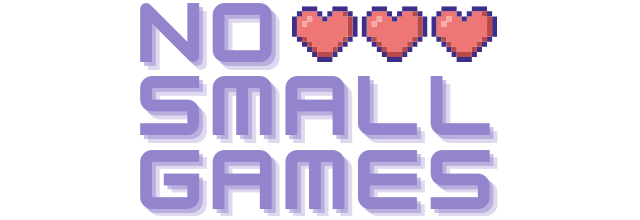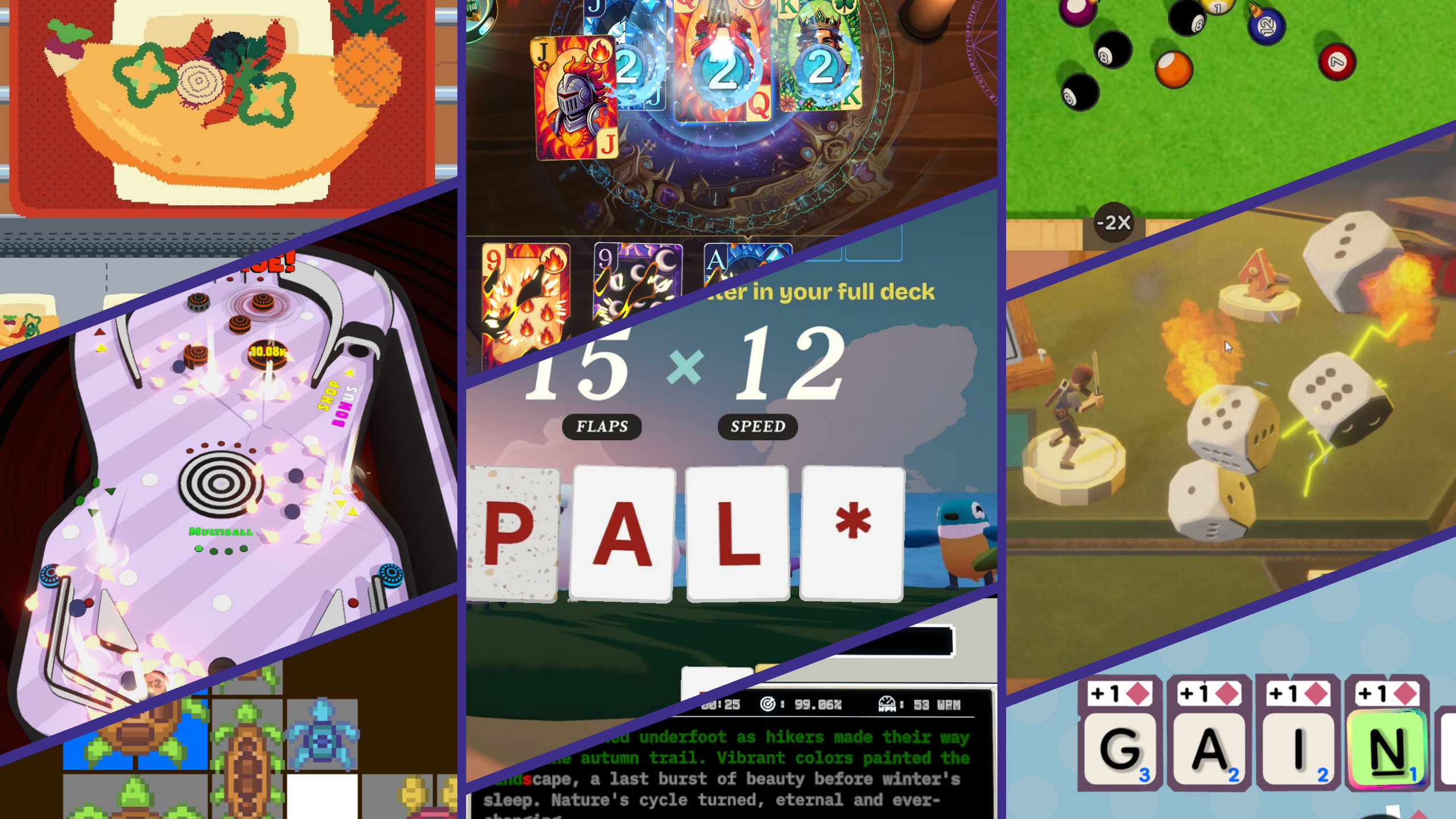
I tried every Balatro-like game I could find in Steam Next Fest
So, now you don’t have to (but you still should).
I’ve said it before and I’ll say it again: bring on all the Balatro-likes you can muster up. I do realize that one day the indie game space will be oversaturated with Balatro-likes and we’ll all be sick of this new micro-genre… but it is not this day!! To my delight, I discovered 10 game demos that fit the bill in Steam Next Fest this February. I’ve compiled my impressions of all 10 demos here, so you too can see the numbers go BIG and the dopamine go BOOM.
I played a few others that looked to be Balatro-likes on the surface, but didn’t include them here, as they fell more in the vein of Slay the Spire and similar card battlers. There were also quite a few other games with specific elements that seemed to be modeled after Balatro’s “house rules” vibe. They were entertaining, but didn’t go on this list if they didn’t match certain criteria that I describe at the end of this article.
Lastly, a reminder that these were all demos, and they will all likely evolve quite a bit before their full releases. Any light criticism offered here is in hopes that it can be useful to the devs, and I have high hopes for all of these titles when they release!
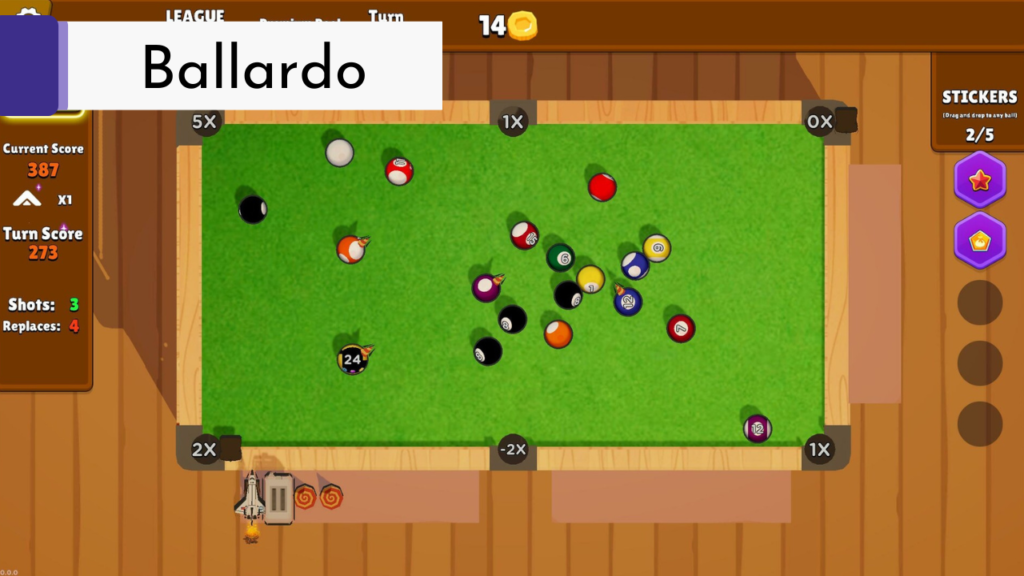
1. Ballardo
Developed by: Nue Games
Ballardo is a billiards-based roguelike deckbuilder, that I would say is about 60% strategy and 40% skill. You get a limited number of shots to earn points, trying to get your overall score to reach the threshold for each round. As you progress, you can buy stickers that enhance individual balls when placed, and relics that enhance your build as a whole in various ways, including placing effects on the table itself.
I really enjoyed the kinetic aspect of the gameplay. It felt good to use multiple parts of my brain throughout the game, as I got to focus on strategy while buying and placing stickers, and calculate spatial tactics while taking shots. This was a tricky one for me, and the difficulty scaled up quickly. Fans of billiards games may find it a lot easier to progress, which is why I say skill is a huge factor in Ballardo.
Release Date: Q2 2025
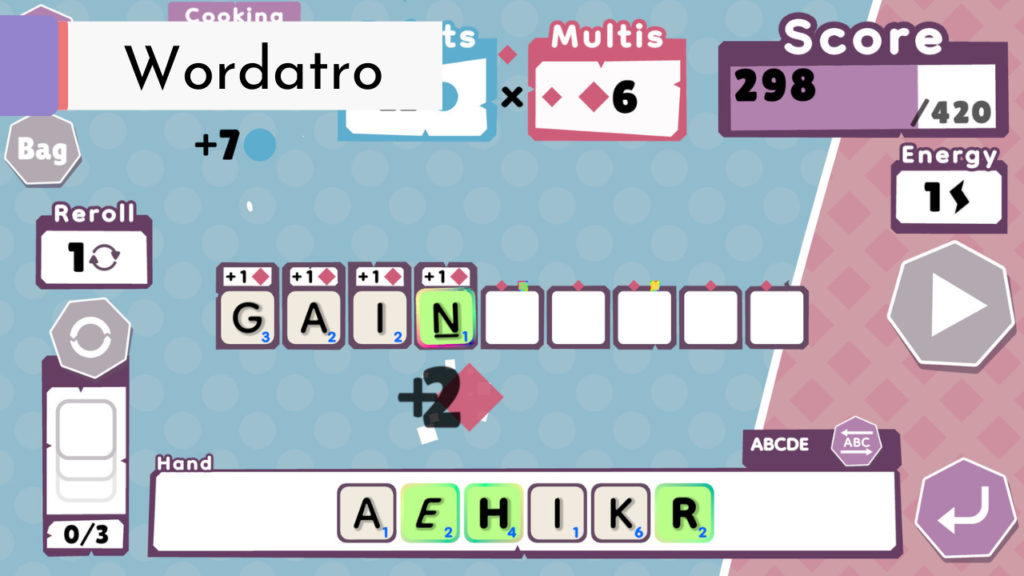
2. Wordatro
Developed by: Le Poulet
Wordatro is one of the first of these Balatro-likes that I learned about prior to Steam Next Fest. The premise is essentially Scrabble scoring with wild house rules and I said to myself “of course! Why didn’t I see this coming?” It’s a brilliant concept and feels like a natural extension of this micro-genre. Scrabble itself already enables players to make “game breaking” combos and leave their opponents in the dust with outrageously high scores by taking advantage of the board’s layout. Wordatro ditches the Scrabble board, but offers really fun and creative bonuses to your build (my favorite are the bonuses like “M. U. L. T.”, which increase your score for every letter you use that’s contained in the name of the bonus itself) and enhancements applied to individual letters.
While in many of these Balatro-likes you rely mainly on enhancements and buffs to your deck to build up your score and proceed, Wordatro is one where the makeup of your deck is critical. I found myself struggling a bit to create words with the letters I was drawing. You can reroll your hand or trade in up to 3 letters out at a time, which I did frequently. When I return to it, I’d like to explore the ways that you can shape your deck of letters and the strategy behind it.
One last aspect that I want to call out is that I really appreciated how clear the scoring was. I found the scoring for each word pretty easy to understand, which I can’t say for all the demos on this list (although I did enjoy all of them).
Release Date: Q2 2025
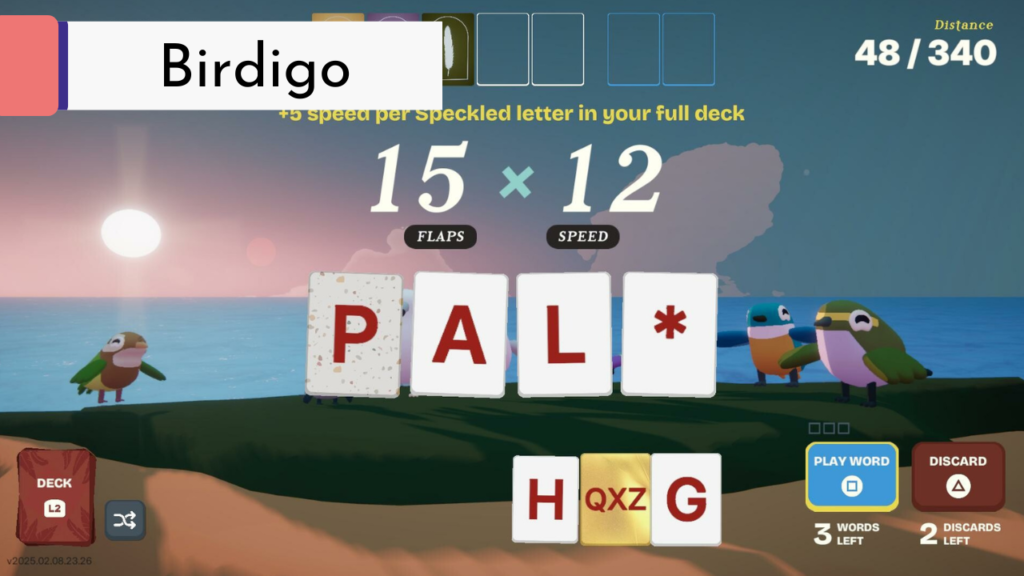
3. Birdigo
Developed by: John August, Corey Martin
Of course, I have to follow up Wordatro with Birdigo. If Wordatro is Balatro-ified Scrabble, then Birdigo is Balatro-ified Banangrams. I can’t quite explain why, you’re just going to have to trust me on that.
Birdigo is a bird-themed, word-based roguelike deckbuilder where you form words to increase your score to meet the threshold and proceed. You will buy and earn enhancements to your build in the form of Feathers, which I found delightful. Letters themselves also receive enhancements and, as you progress, opportunities also arise to add new and enhanced letters to your deck.
This one hooked me for quite a while and I found it very approachable to create words to play. Not to compare it too much to Wordatro, but your hand size is a little bit smaller (at least to start with) in Birdigo and it seems that the target scores and point schemes are a bit more tailored to shorter words. I also just found it so charming to be accompanied by the little flock of birds that accumulates as you progress. They bob happily in unison in the background as you contemplate the word you plan to play. That said, I really enjoyed both Birdigo and Wordatro and will return to both when they release!
Release Date: 2025
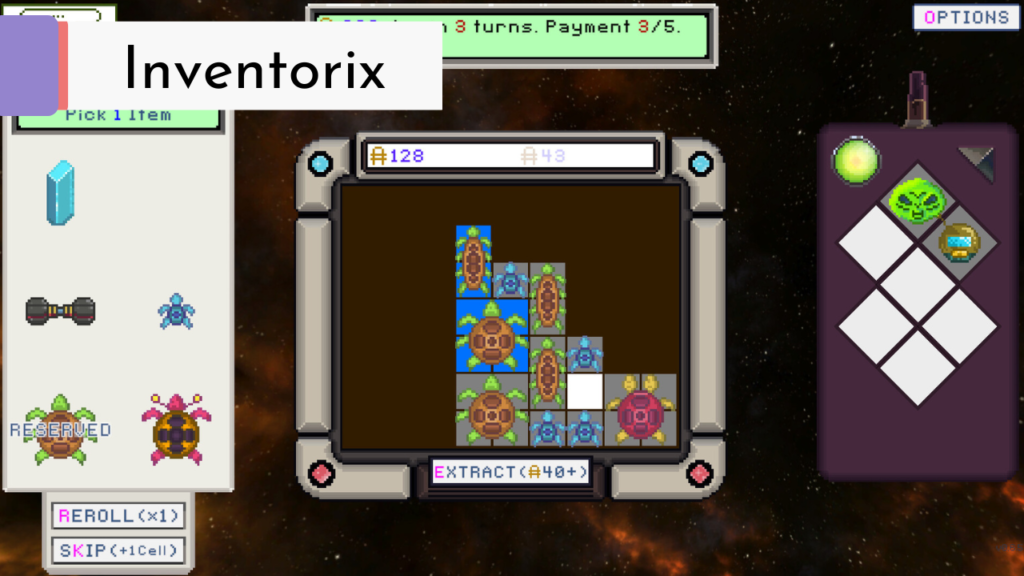
4. Inventorix
Developed by: Arcaludi
I wasn’t sure what exactly to expect from Inventorix when I launched the demo, but within a few minutes of gameplay I was saying “Oh no,” to myself, “this is possibly too fun.” Inventorix is an inventory management Balatro-like, where you gather up space junk and arrange it within the square cells of your cargo hold. You’ll find items like machines, minerals, space flora, and turtles! Every item you discover possesses some kind of effect or quality that allows it to synergize with other space junk you’ll find along the way.
This presents an interesting twist to the deckbuilding concept, given that you start off with an empty cargo hold and get to choose a single item in your first round. So rather than having a default deck that you can enhance or alter, you start with nothing and build up your deck from there. I really enjoyed the spatial aspect of Inventorix, and had just as much fun trying to rearrange my space junk in the most optimal way possible, as I did selecting each new piece of junk along the way.
My main hope for the full game is that it will introduce more types of objects and opportunities for synergy. I encountered 4-5 different types of space junk, and while they naturally synergized with each other pretty easily, it seemed like there were only a few viable strategies to combine them. That said, I was immediately addicted and will be keeping an eye out for Inventorix’s full release.
Release Date: TBA
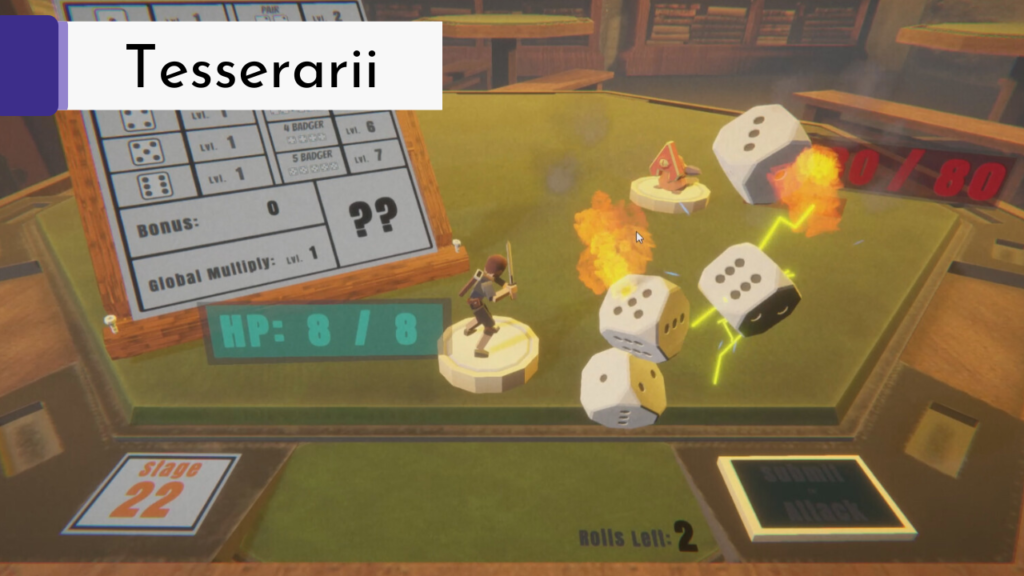
5. Tesserarii
Developed by: Dylan Van Beek
Tesserarii is the closest to a combination of both Slay the Spire and Balatro that I have included in this list. I do think it falls under the umbrella of the Balatro-like genre, but you’ll find elements of both here. The game plays on the idea of TTRPG combat, but without a board or map of any kind. You fight a sequence of monsters with increasingly high health points, which you must defeat by rolling several 6-sided dice. You also take damage from your opposing monster after each turn, but it’s a pretty consistent amount, such that your HP seems fairly analogous to having a limited number of hands you can play in Balatro. If you can’t beat the monster within N number of hands, you lose and must restart.
The hands you can play with your rolled dice feel very reminiscent of Yahtzee: you have options like a pair, two pair, four-of-a-kind, etc. that get scored based on the value on the dice. Similar to Wordatro, I appreciated how clear the scoring schema was. One quirk of Tesserarii is that each of the enhancements you can buy along the way also come with a pretty punishing downside. You may have to opt for a trade-off where your two pair hands gain a multiplier, but your max HP decreases by 3. Because of this, I found it really challenging to develop a strategy that would allow me to take down the first boss.
Overall, it’s an intriguing concept and I loved the 3D modeled player character and monsters, in the form of TTRPG figurines, and getting to actually see the dice roll across the play area felt very satisfying.
Release Date: TBA
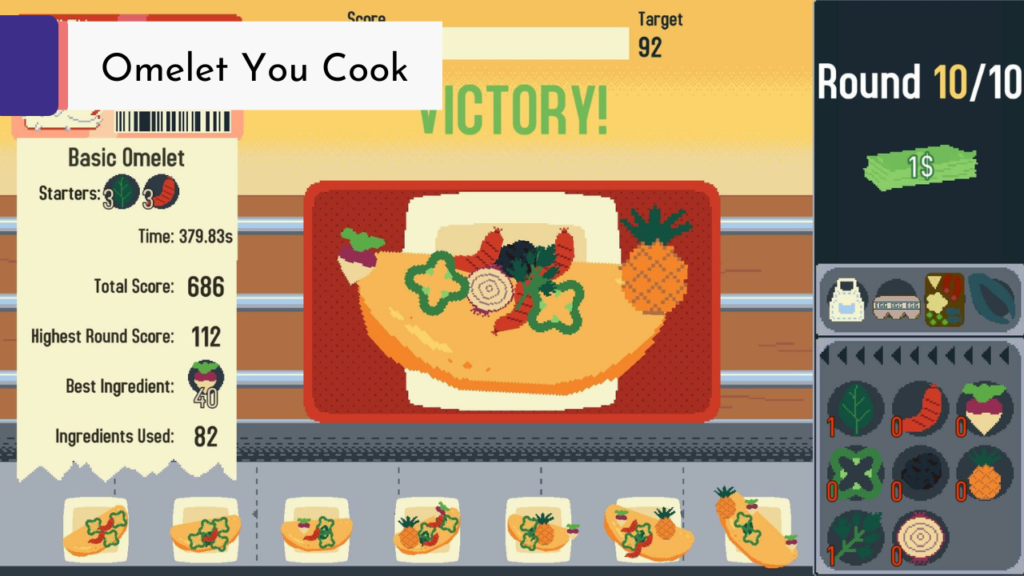
6. Omelet You Cook
Developed by: Dan Schumacher, SchuBox Games
Omelet You Cook is a statistical inevitability. One day or another, we were eventually bound to get a cooking-based Balatro-like. And here it is! Omelet You Cook sets you up as a short-order chef assembling omelet orders for little critters with very specific tastes.
The “deck” you’re working with is a set of ingredients, which get drawn and presented to you on a conveyor belt, three at a time. You select one of the three options, and a new set of three roll out to you. The ingredients, including bacon, peppers, parsley, and many other veggies, meats and even fruit, all get scored based on the other ingredients present on the omelet. In between rounds you can choose to buy ingredient crates, essentially booster packs where you can pick from one of three randomly selected ingredients, or pick up relic-type objects that boost your build overall.
Omelet You Cook provides the fun twist that all of your ingredients have to fit physically on top of the omelet, and many of their scoring effects have to do with what other ingredients they’re adjacent to or overlapping with. Similar to Ballardo, this let me use a different part of my brain in addition to the scoring strategy side, which I really appreciated. Overall, this was a clucking good time and I’m looking forward to the full release!
Release Date: TBA
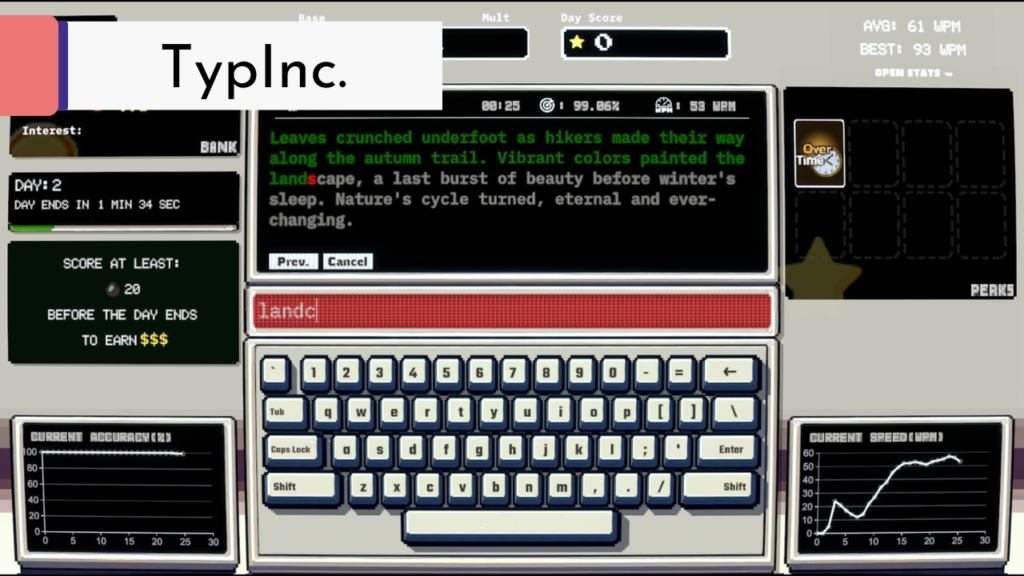
7. TypInc.
Developed by: Game Game Games
TypInc. is a fascinating blend of Balatro-like gameplay and typing practice. The game kicks off by welcoming you to your new job as a typist at TypInc. Each “day” on the job you must hit a specific ever-increasing score threshold, which is calculated by your base score times a multiplier that is dictated by your accuracy while typing. As a twist, rather than having a certain number of rounds or “hands” you can play, TypInc. gives you a time limit that represents each day. You have to type as much as you can in order to reach your target score, as the clock ticks down.
In between rounds, you can buy enhancements which include passive buffs (called “perks” here), and enhancements to specific keys on your keyboard. There’s something especially fun about the idea of upgrading your keyboard before each new round of typing prompts.
Similar to Ballardo, how well you do in TypInc. depends largely on the skills you bring to it. If you can touch type (like I can, not to brag), you’re going to have a huge leg up in this game and the time limit isn’t going to mean a whole lot. That said, I still enjoyed TypInc. a ton and I will probably pick the demo back up before the planned full release in Q2 of 2025.
Release Date: Q2 2025
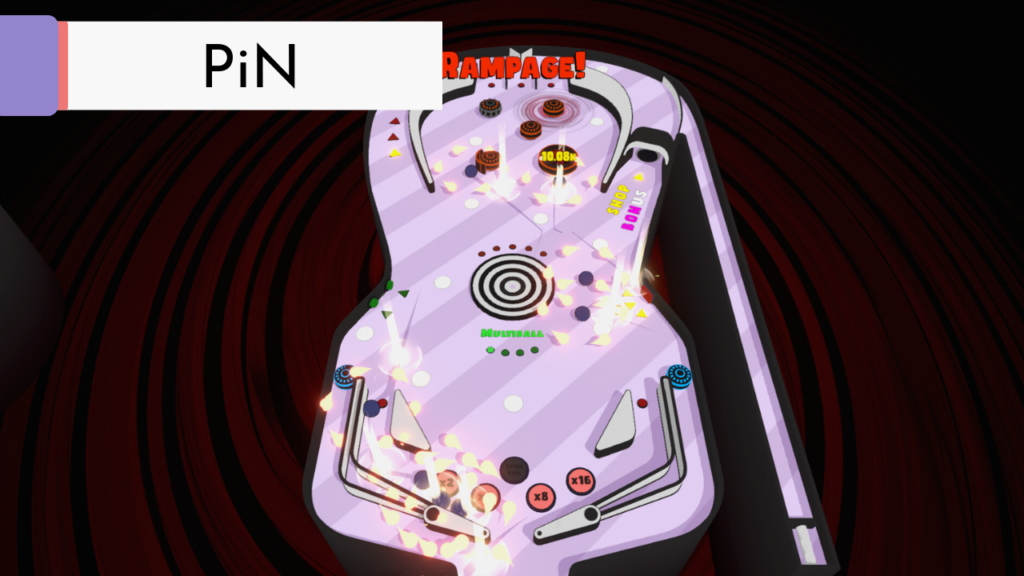
8. PiN
Developed by: KennyMakesGames
If you’re looking to see numbers get BIG fast, what better combo than Balatro-ified pinball? PiN is a pinball roguelike deckbuilder, absolutely packed with adrenaline. The catch is that not only are you trying to get a great score, in order to proceed from one stage to the next you have to destroy all the bumpers on the board. This requires both strategy in designing your loadout, as well as skill at the game of pinball.
My first impression of PiN was that there is a lot going on visually, which is to be expected with any pinball game. I personally found it a little bit challenging to track my progress through the stage and to figure out what I needed to do in the moment to clear the board. But I’m also not a big pinball player, so I’m at a bit of a disadvantage here.
In spite of my own skill deficiencies at the pinball gameplay, I still had a blast playing PiN! If Balatro doesn’t provide enough dopamine hits straight to the brain cells, this will certainly do the trick.
Release Date: 2025
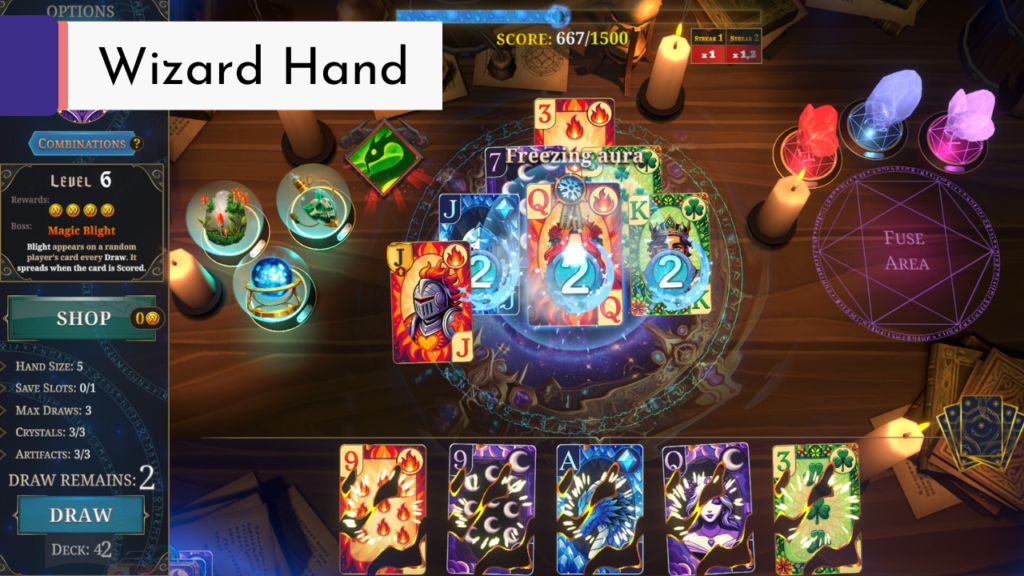
9. Wizard Hand
Developed by: Capibarium
Listen to me right now: do not play Wizard Hand. Not if you have anything you need to get done EVER again. This was by far the Balatro-like demo that hooked me the fastest and longest, and if I’m not careful, I might just boot it back up again as we speak. Wizard Hand is a Balatro-ified version of Solitaire, where you have two objectives to accomplish each round. First, in true Balatro fashion, you have a score threshold to reach by scoring points. In order to do this, you must work towards your second objective of removing all the cards from a Solitaire-style pyramid, by combining them with cards in your hand. You can only progress to the next stage when you have removed all the cards in the pyramid and reached the minimum score required.
In addition to playing various types of card combinations, you can also increase your score using individual card enhancements, artifacts that provide various buffs, and there’s even a whole system of crafting cards using the properties of various crystals. There is a lot going on in Wizard Hand, but something I really appreciated was how clear and understandable all the terminology is for new players. The tooltips that appear upon hovering over cards, artifacts, etc. very clearly explain the various effects and mechanics, which is not always true in other Balatro-likes that I’ve played. For example, as much as I love Ballionaire, I felt quite confused during my first run and it took a while to understand all the unique terminology.
All-in-all, Wizard Hand is a fantastic addition to this micro-genre and I will be anxiously awaiting its full release later this year.
Release Date: Q2 2025
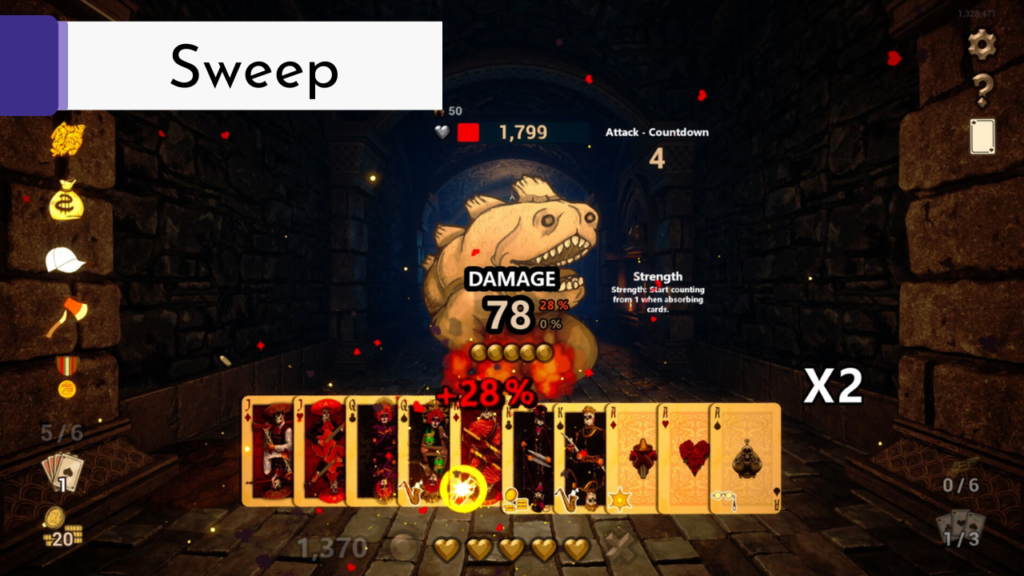
10. Sweep
Developed by: On.Production
Sweep is another deckbuilding roguelike that straddles the line a little bit between Balatro’s gameplay and Slay the Spire, but leans enough towards Balatro that I felt it belongs on this list. In Sweep, you play card combinations to load up your submachine gun with ammo, which you will unleash upon a series of monsters with escalating amounts of hit points.
While the default deck is a standard set of 52 playing cards, the combinations are a little different than the poker hands you play in Balatro. I found myself checking the combination guide quite often for the first few rounds, but picked up the concepts pretty quickly from there. Another difference in how you play your card combos is that the game actively encourages you to clear your whole hand before the monster has a chance to attack. The Sweep devs designed the card combos such that you could potentially clear all 17 cards from your hand in a single play.
If you love Balatro, but are looking for a little bit more worldbuilding and ambiance (and guns) in your gameplay experience, Sweep is a great option.
Release Date: Mar 28, 2025
What’s in a name? That which we call a Balatro-like, by any other name would be as hard to put down.
Now that we’ve covered the demos, I wanted to briefly talk about my selection process and criteria, since I omitted a few games from my initial list. Here are, as I see them, the essential characteristics of any Balatro-like game:
- Fundamentally, they are deckbuilding roguelike games, but specifically with the goal of producing the highest score possible during each round.
- The scores you are working to earn are matched up against a single “winning” score, which scales up dramatically as you progress through each round.
- Enhancements can be made either to the individual items in your deck (be they cards, dice, letters, billiard balls, etc.) or to your build as a whole through items with passive effects. Most of these enhancements impact how your “hand” is scored when played, but may also affect how much money you earn during rounds, how many items you have in your hand, etc.
- Usually players earn a currency that they can spend to buy enhancements in between rounds (or, in rare cases, during rounds).
- I excluded most games with web-like maps that let you choose your path. Balatro progresses in a linear way, presenting you with a series of Blinds that escalate in difficulty and you can either play them then go to the shop, or skip the round for a reward.
- Any game where you’re not generating a score, but just beating levels using a different style of gameplay got removed from the running. For example, there were a couple of Minesweeper-style demos with “house rules” and various enhancements that seemed modeled after Balatro. But if number didn’t go BIG, it’s not on this list.
About No Small Games
No Small Games is an indie game recap and review podcast brought to you by hosts Kate and Emily! They became friends while streaming on Twitch and bonded over their love of indie video games. In each episode of No Small Games, the two will discuss an indie game they both played independently. They’ll compare their experiences: the good, the bad, their most memorable moments of their playthroughs.
Learn more about the podcast and its hosts on the About page.

